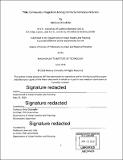Title : community integration among formerly homeless veterans
Author(s)
Chinchilla, Melissa
DownloadFull printable version (7.299Mb)
Alternative title
Community integration among formerly homeless veterans
Other Contributors
Massachusetts Institute of Technology. Department of Urban Studies and Planning.
Advisor
Amy Glasmeier.
Terms of use
Metadata
Show full item recordAbstract
My dissertation examines the community integration outcomes of formerly homeless Veterans housed under the Department of Housing and Urban Development-Veterans Affairs Supportive Housing (HUD-VASH) program. HUD-VASH provides homeless Veterans with affordable housing subsidies and supportive services, including non-mandated linkages to healthcare. The program functions under two types of housing vouchers: vouchers used in buildings designated for persons with subsidized housing (project-based) and vouchers used for market rate rentals in the community (tenant-based). HUD-VASH is the largest permanent supportive housing (PSH) program in the nation, with over 86,000 vouchers (~6% project-based) awarded through fiscal year 2017 and 100,000 Veterans housed since the program's inception. Research suggests that persons in PSH have limited success in community integration, which has important implications for health, substance use, subjective well-being, and housing retention. My research provides an understanding of how role of multiple factors - individual characteristics, service utilization, housing choice, and neighborhood quality - impact formerly homeless individuals' community integration process, i.e. how they function in their new communities including their relationships with others, ability to maintain independent living, and engagement in vocational activities. My dissertation uses mixed methods to understand housing placement of HUD-VASH participants in Los Angeles County and their community integration outcomes once housed. This dissertation is made up of three manuscripts; (1) Paper one provides an overview of housing models under the HUD-VASH program including a description of socio-demographics, clinical diagnoses, service utilization patterns, and neighborhood quality of project based and tenant based voucher types; (2) Paper two uses quantitative analysis to identify factors, including personal characteristics, voucher type (i.e., project and tenant-based), and service utilization, that mediate community integration outcomes (i.e. employment, community adjustment, and housing retention); and (3) Paper three provides a qualitative analysis of VA staff and HUD-VASH participants' perspectives of the roles of housing type (project-based vs. tenant-based), neighborhood characteristics, and social networks on participants' community integration.
Description
Thesis: Ph. D., Massachusetts Institute of Technology, Department of Urban Studies and Planning, 2018. Cataloged from PDF version of thesis. Includes bibliographical references.
Date issued
2018Department
Massachusetts Institute of Technology. Department of Urban Studies and PlanningPublisher
Massachusetts Institute of Technology
Keywords
Urban Studies and Planning.